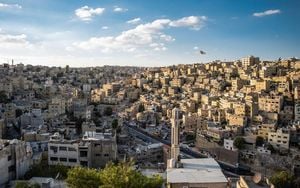Political turmoil continues to grip South Korea, as impeached President Yoon Suk Yeol faces serious accusations related to his controversial attempts to impose martial law and avoid arrest. Authorities have officially booked Yoon over his alleged orders aimed at obstructing investigations against him, as reported by South Korean media.
Yoon is suspected of directing the Presidential Security Service to block investigators’ attempts to detain him last month. This scrutiny follows his dramatic decision to declare nationwide martial law on December 3, citing threats from pro-North Korean elements.
According to local news sources, investigators recovered text messages exchanged between Yoon and Kim Seong-hoon, the deputy chief of his security service, during their raid at the presidential residence. The seriousness of the situation is underscored by the Constitutional Court's anticipation of concluding Yoon’s impeachment trial this coming week, with the verdict expected by mid-March.
Suspended from duty since December 14, Yoon is presently detained on insurrection charges, contending with challenges not only from legal authorities but also from civil society. “We want him out!” became the rallying cry of massive demonstrations following his martial law declaration, which curbed political activities and basic civil liberties reminiscent of repressive regimes.
Moments after the martial law was announced, swift action by the National Assembly effectively overturned the decree within hours. Citizens and lawmakers joined forces, executing a remarkable resistance against the self-coup, demonstrating South Korea’s commitment to democracy. It became clear through both grassroots movements and rapid political maneuvers within the assembly how entrenched the principles of democratic governance are within the South Korean populace.
Protesters assembled quickly outside the National Assembly—over 16,000 strong—blocking armored vehicles and circumventing attempts to restrain their elected representatives. Many were ordinary citizens, including elderly individuals who risked everything, showcasing their dedication to defending their rights.
The civilian response was complemented by strategic action from politicians who took to social media to mobilize support, refusing to back down against initial threats from military authority. Commentary across various platforms highlighted how South Korean politicians acted with remarkable urgency and resolve compared to perceived hesitance from other political leaders globally.
After the National Assembly voted to demand the martial law withdrawal, the president swiftly complied, lifting the decree just six hours after declaring it. The speed of this remarkable turnaround emphasizes the citizens’ effective organizing and collaborative efforts to uphold democratic norms.
But, Yoon's challenges didn’t end there. Following both domestic and international outrage surrounding the martial law decree, citizens began calling for the president's resignation and impeachment even as he was indicted on insurrection charges.
What had begun as Yoon’s attempt to consolidate power turned swiftly against him, igniting questions of legality, authority, and respect for democratic processes. South Korean citizens demonstrated how proactive civic engagement can create significant political change, actively opposing the very structures of authority meant to repress them.
The lessons from this turbulent period are many. One major takeaway is the necessity for citizens to act decisively and collectively when democracy is under threat. There's also the importance of rallying support across various demographics, as demonstrated by the age-diverse turnout during protests.
This civic action didn’t simply materialize out of thin air; it was informed by the successful impeachment of former President Park Geun-hye, reminding South Koreans of the efficacy of their voices when united. The protests evolved, marking milestones like the introduction of light sticks as new symbols of resistance, reminiscent of concert rallies, integrating culture with political belief.
All eyes remain on the Constitutional Court, which has the authority to decide whether Yoon Suk Yeol will be reinstated or formally removed from office. With parliament and the populace engaged actively, the court’s decision will likely shape the political future of South Korea.
Further complicate matters, investigations are now underway, with calls for accountability extending beyond Yoon to cabinet members and military personnel involved during the martial law attempts. The fallout from these developments could reshape South Korea's political fabric long-term.
Meanwhile, civil organizations launched concerted efforts to pressure the court to expedite its deliberations. Over 1.5 million people turned out for mass demonstrations demanding Yoon’s resignation recently, triggering discussions about the future of Korean democracy and governance.
For now, South Korea stands at a pivotal crossroads, facing necessary reckonings with its democratic ideals and the continuing evolution of civic engagement.
With the extraordinary response of the public and parliamentary members alike, South Korea continues to illuminate the power of democracy and the possibilities inherent when citizens rise to defend their rights.



